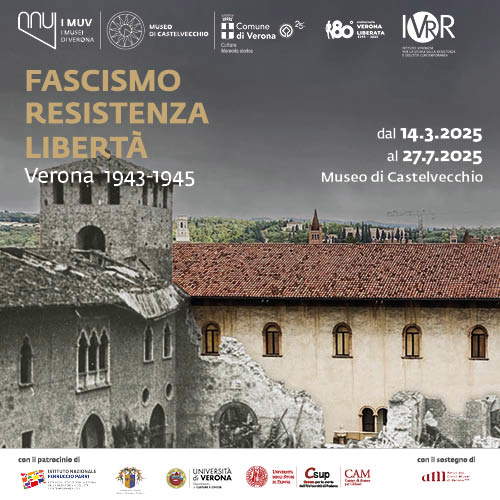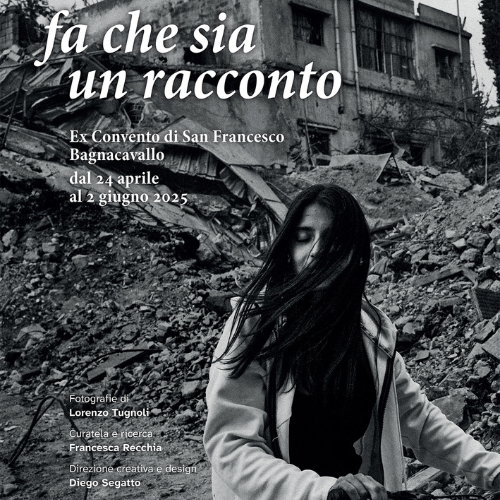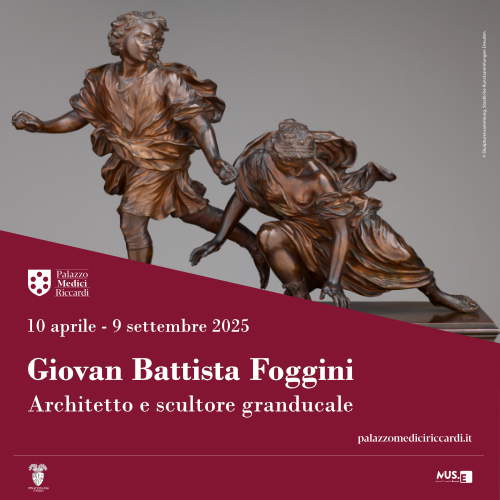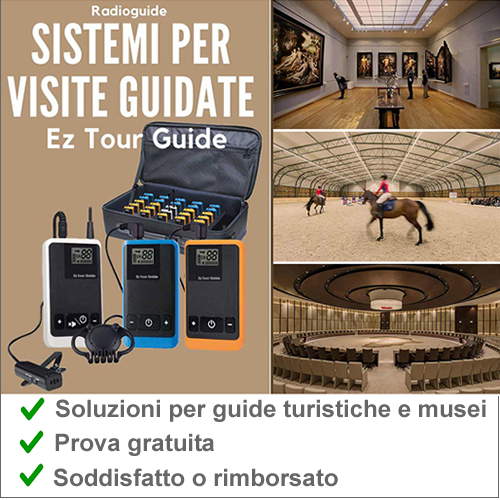Event in Venice to support museums and culture. "A development model should be changed."
An important demonstration in support of culture was held this afternoon in Venice, with the aim of asking the administration to change the development model with which the historic center has been administered so far: no longer, therefore, a model based on the intensive exploitation of mass tourism, but quality tourism combined with a culture that returns to being at the center, at the service of citizens. The demonstration was promoted by the national association
The demonstration lasted from 2:30 p.m. to 4:30 p.m., with the procession moving from Campo San Bortolo (one of the city center’s major transit points) to the nearby Rialto Bridge. The cue stemmed from what had happened in recent months, with the Fondazione Musei Civici famously expressing in late December its intention not to open the museums until April, regardless of the turn the health situation would take. And unequivocally explaining the reasons for the closure had also been the mayor, Luigi Brugnaro, in very explicit words: “The objective,” he had said referring to the museum facilities, “is to keep them ready to be usable when tourists return to this city.” And he had added, “We will work precisely to reopen, but out of a sense of responsibility we obviously cannot throw energy and money to the wind, it would be a financial loss for everyone.” All this despite the fact that the Foundation has had steadily growing numbers and receipts over the past ten years, and despite the fact that it has received 8 million euros in aid from the state, which enabled the Foundation itself to close the 2020 budget in profit.
The organizers let it be known, however, that that of the Venice Civic Museums is not an isolated case: “there are very many cases of foundations that, financed with public funds, are not guaranteeing services and employment in these months,” they stress in a note. “On the contrary, it fits into the picture a cultural system based on privatization, precariousness and exploitation, the result of a decades-long political drift for the benefit of a few interest groups that profit and profit from mass tourism. A situation not limited to the cultural sector, leading to a decline in services and widespread impoverishment: the pandemic has only given the final lacceleration to a system that was already not holding up. For this reason, also considering that Venice will receive 3.8 billion of the Next Generation EU funds, the event will start from the case of the Civic Museums to discuss the entire system of cultural heritage and entertainment in Venice, contextualizing it on the national level.”
 |
| Images of the event |
 |
| Images of the event |
 |
| Images of the demonstration |
Demands of the demonstrators
An appeal was launched from the demonstration with four clear demands. The first is theimmediate resetting of the Board of Directors of the Fondazione Musei Civici di Venezia, resulting in the resignation of the entire management. The protesters are also demanding that there be the resumption of all non-public-facing activities, the reopening of the Civic Museums to the public and the consequent safe return of the workers, whether employees or outsourced (barring new national or local measures intervening in the closure), and the initiation of an institutional table to discuss the future of the Fondazione and the museums that the Fondazione itself manages, in favor of a new management that includes inclusion and involvement of the citizenry as fundamental principles.
The second demand of the square is theestablishment of a table with the City Council, the Ministry and social partners to build a structural reform plan of the entire Venetian cultural system, overcoming the logic of servitude totourism, fragmentation into foundations and systemic recourse to outsourcing, and instead moving to an organic system that enhances the city, professionalism and services regardless of the presence or absence of tourists. The organizers also call for the establishment of a Department of Culture of the City of Venice (in fact, it seems unbelievable but at the moment Venice does not have an alderman who has the delegation to culture, assigned to the mayor).
The third demand is theestablishment, with the Region and the Ministry, of a guaranteed basic income at least until the end of 2022 for self-employed workers in the culture and tourism sectors, seen by the protesters as the unconditional lavvio of a basic income for all and sundry. Also demanded is the passing of the layoff fund for employees, with a guarantee of 100 percent of salary even during times of closure due to epidemiological trends. Finally, the square’s last demand, immediate municipal investment in all cultural services (museums, libraries, cinemas, theaters, archives), as well as in other public services for citizenship, resulting in an extraordinary hiring plan to cope with these months of emergency; planning, activation or conclusion of calls for the free loan of municipal spaces to associations and individuals active in the cultural sphere.
 |
| Images of the event |
 |
| Images of the event |
 |
| Images of the event |
“Venice must not return to normality, because normality was the problem.”
“Venice’s is not an individual problem, but a collective one,” explained Alice Battistella, Mi Riconosci activist as well as cultural worker who, like so many of her colleagues, is currently in a far from idyllic situation: in possession of a VAT number, she worked until the end of February 2020, then again in the summer albeit sparingly and with radically changed conditions compared to the past, although fortunately, thanks to her ATECO code falling within the categories eligible for refreshments, she was able to access the state assistance provided for workers most affected by the closure measures to contain the Covid-19 contagion.
“I would not like,” he says, “to see a return to the city as it was before: in Venice (but not only there) the system was structured in such a way that a few were satiated while a flood of workers were fed with crumbs, and the more the cake grew the less the crumbs grew. Tourism needs to be rethought, it needs to be administered in such a way that it creates quality jobs, and therefore quality services, so that it is an industry that gives more than it takes away from the city. Venice cannot, must not depend on tourism but can make intelligent use of it, with entirely new policies than those activated so far. Closed museums, closed municipal services right now mean preventing tour guides and operators from carrying on a work based on outreach tourism, and on residents who want to know their cultural heritage. But not only that: it means not having a project for the city other than tourism, again assigning to culture the role of mere handmaiden of tourism, not giving the possibility of discovering a different way of experiencing the city, harnessing the city in a past that you want to force to be a future.”
“Living and working in Venice,” Battistella concludes, “is a dream that is in danger of becoming a nightmare, with tourist-friendly cities and services for citizens gradually disappearing. I would like every citizen not to be denied the right to enjoy culture in the city, I would like culture put back at the center of the city debate and tourism put at the service of the city. I would not want for Venice a return to normality, because normality was the problem. We have an alternative: let’s change the model, let’s save Venice.”
 |
| Images of the event |
 |
| Images of the event |
 |
| Images of the demonstration |
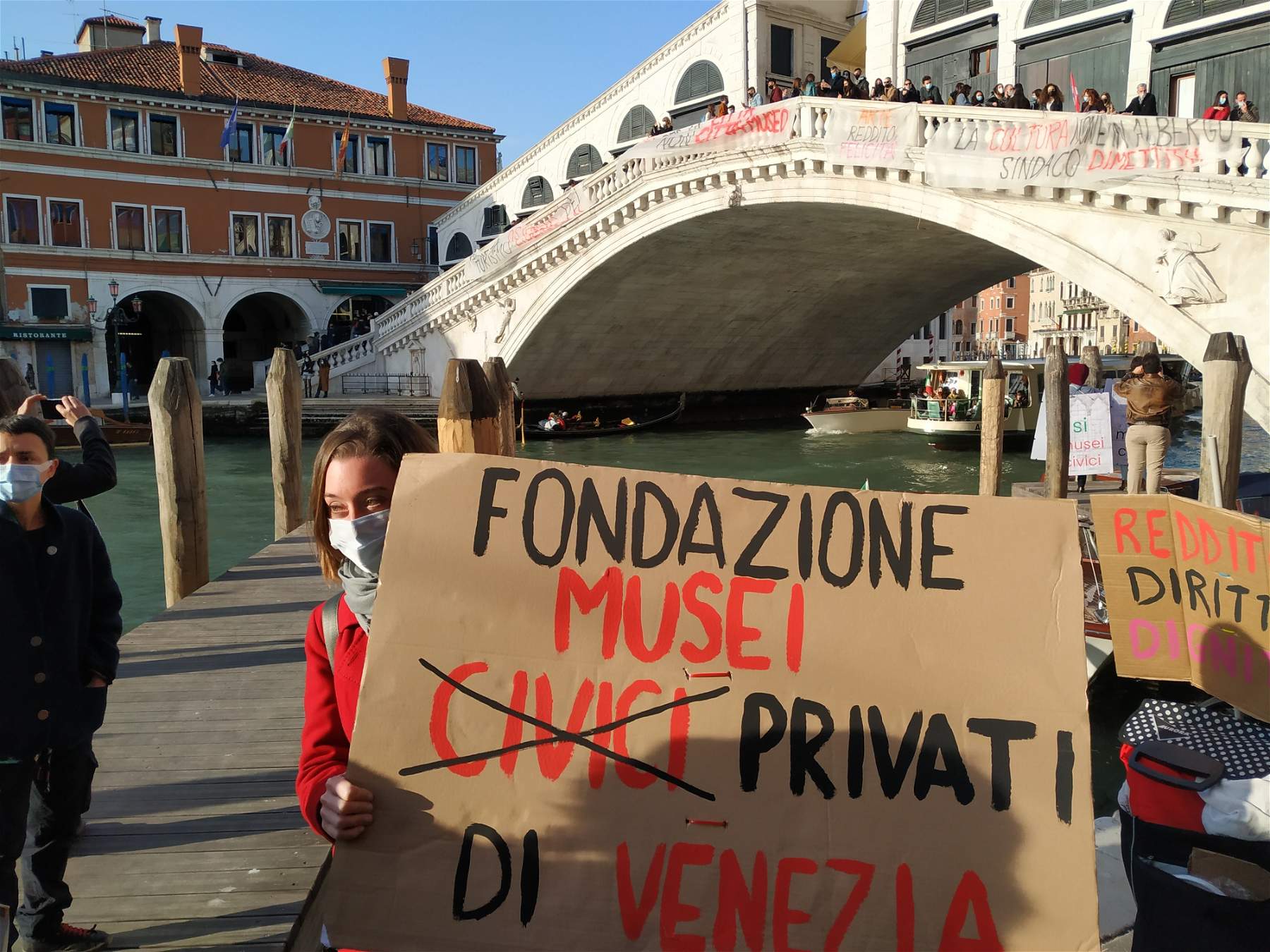 |
| Event in Venice to support museums and culture. "A development model should be changed." |
Warning: the translation into English of the original Italian article was created using automatic tools. We undertake to review all articles, but we do not guarantee the total absence of inaccuracies in the translation due to the program. You can find the original by clicking on the ITA button. If you find any mistake,please contact us.





